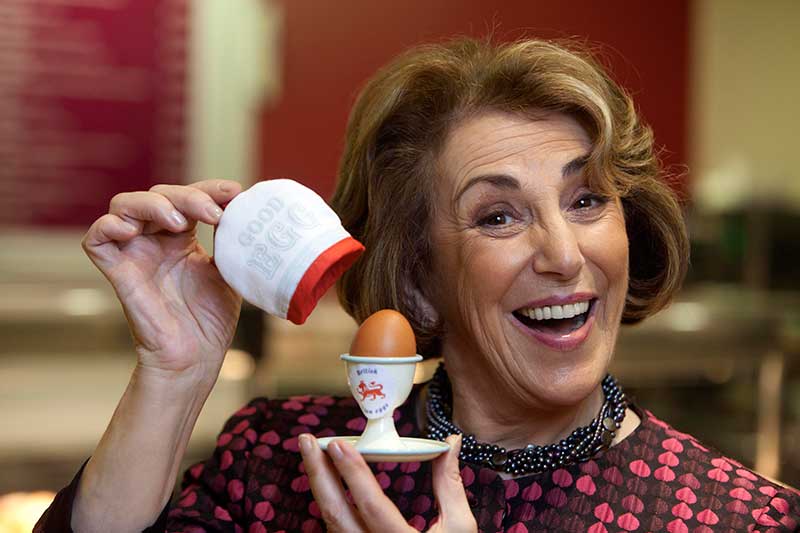
The British Egg Industry Council is looking for a significant increase in egg consumption in the United Kingdom in the coming year.
BEIC chief executive Mark Williams told the Ranger magazine that the council was hoping for an increase in consumption of five per cent in 2014 after 2013 saw UK egg sales finally return to pre-salmonella-scare levels in a year that marked the 25th anniversary of Edwina Currie-gate. Mark said that the success of the Lion in helping the egg industry to recover from the former Government Minister's infamous claims about salmonella in eggs was clear for all to see.
"Few can argue that the Lion scheme has had a dramatic effect on the egg market in the UK," said Mark. "Not only have we banished consumers’ fears about the health and safety of their eggs, but we’ve also reinvigorated sales and, this
year, we’ve finally seen consumption return to pre-Edwina Currie levels," said the BEIC chief executive.
"It’s taken some time to get there, but we’ve done it and, if 2013 was the year of anniversaries, then 2014 must be the year to drive the egg market forward. We are in the perfect position to build on consumer demand for a product that is now seen as healthy, safe and something that you should put on the shopping list. That’s a far cry from the dark days of the late 80s and something of which the industry should be rightly proud.

"We are hoping to see overall growth of around five per cent this year, something that we could only have dreamed of in the 1990s when we were seeing year on year declines of more than eight per cent. Of course, with the egg industry nothing is ever going to be plain sailing and we have work to do to ensure that we are ready to meet the challenges ahead."
At the annual conference of the British Free Range Egg Producers' Association (BFREPA) in November BEIC chairman Andrew Joret said that the consumption of eggs in the United Kingdom had increased by 12.3 per cent over the last decade. Per capita consumption stood at 182 in the UK, according to 2012 figures. However, he said there was still room for further growth because the 2012 figure was still below the European Union average of about 215 eggs. Andrew said that free range accounted for 44 per cent of the increased overall market in the UK, with cage eggs accounting for 50 per cent, although in the higher value retail sector free range enjoyed 53 per cent share. Free range accounted for 22 per cent of the processing sector. Notable retailers like Marks & Spencer had committed to sourcing food products containing free range eggs. The percentage of the food service market enjoyed by free range was 12.5 per cent. In this sector, too, there were notable customers such as MacDonald's, he said.
Mark Williams told the Ranger that the UK egg industry had to be watchful to ensure it was not disadvantaged in international trade deals being negotiated by the European Union.
"In the absence of a World Trade Organisation multilateral trade deal, different countries are looking towards bilateral deals - one to one," he said. "We will continue to press to ensure that our industry, which has made significant strides in animal welfare with the implementation of the Welfare of Laying Hens Directive, is protected from products made outside the EU that do not reach the same standards. The BEIC will be working hard with our EU partners within EUWEP to push for sensitive status for eggs and egg products to reflect the investment that we have made, which in the UK alone equates to some £400 million."
Mark said that the total investment by the egg industry across the European Union amounted to some four billion Euros.
Mark also pointed to the issue of beak trimming as one that the industry would need to address in the year ahead. A complete ban was originally due to come into force in 2011 but it was put off on the advice of the Farm Animal Welfare Council, which was concerned about the impact the ban would have on incidence of injurious pecking and cannibalism. The Government has said that the issue will be reviewed in 2015 with a view to a ban coming into force in 2016. Trials are currently taking place, although an outbreak of pecking on one free range trial unit resulted in a mortality rate of more than 25 per cent.
Mark said, "This is an animal welfare issue that needs to be addressed and we will continue to work with Government and politicians etc to try to ensure that this will only be introduced when it will not have a detrimental effect on the welfare of the hens."
But, despite this and other challenges facing the industry - including the volatile price of feed - he said that producers should not lose sight of the fact that the British egg industry was one of UK agriculture’s biggest success stories. He said it was testament to the hard work, dedication and investment by those throughout the industry that it was in the positive position it was today and was ready to capitalise in 2014. n
